高中英语倒装句讲解
高中英语语法倒装句总结讲解

高中英语语法倒装句总结讲解1. 完全倒装:即将谓语动词的全部置于主语之前。
常见用法:1) 当here, there, in, ou t, up, down, on 等副词置于句首,且主语为名词时;2) 将表示地点、方位的介词短语置于句首;3) 直接引语置于句首,其后的主语是名词时。
2. 部分倒装:即将谓语动词的一部分置于主语之前(如助动词be, do, have, will,和情态动词may, can, must, should 等)。
常见用法:1) 否定词或词组,如neither, nor, never, nowhere, not, seldom, rarely, scarcely, barely, hardly, no sooner, at no time, in no case, in no way, by no means, on no condition 等置于句首时;2) so 表示“也”,neither/ nor表示“也不”;so / such… that 表示“那样……以至于”置于句首时;3) only + 状语/ 状从,置于句首时, 主句要部分倒装;注意:当only + 主语置于句首时,则用正常语序。
4) not only … but also…引导两个分句时,not only 引导的分句要部分倒装;5) not until + 状语/ 状从,“直到……才”,置于句首时,主句要部分倒装;6) adj. / adv. / n. / v. / 分词+ as / though + 主语+ 谓语:引导让步状从,置于句首时;7) 在虚拟语气的条件句中,如含should, had, were, 可将它们置于句首,且省略if;8) 用于:May + 主语+ v. 结构中,表示“祝愿”;9) 表示次数、频率的副词置于句首时(也可用正常语序)。
倒装句口诀:副词开头要例装,人称代词则如常。
only修饰副介状,位于句首半倒装。
高中英语知识点归纳倒装句的特殊情况和用法
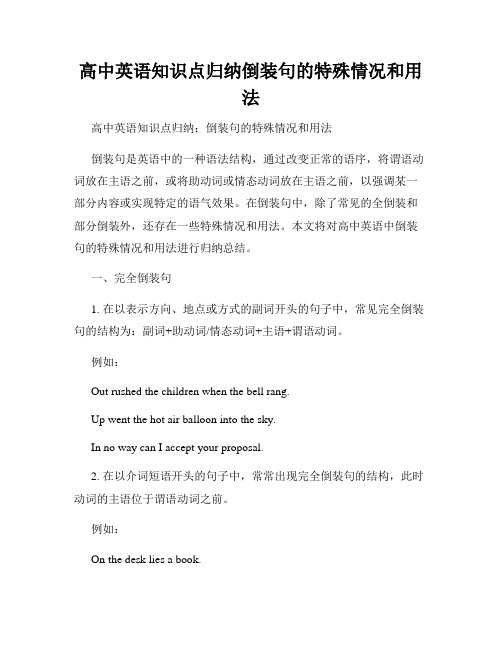
高中英语知识点归纳倒装句的特殊情况和用法高中英语知识点归纳:倒装句的特殊情况和用法倒装句是英语中的一种语法结构,通过改变正常的语序,将谓语动词放在主语之前,或将助动词或情态动词放在主语之前,以强调某一部分内容或实现特定的语气效果。
在倒装句中,除了常见的全倒装和部分倒装外,还存在一些特殊情况和用法。
本文将对高中英语中倒装句的特殊情况和用法进行归纳总结。
一、完全倒装句1. 在以表示方向、地点或方式的副词开头的句子中,常见完全倒装句的结构为:副词+助动词/情态动词+主语+谓语动词。
例如:Out rushed the children when the bell rang.Up went the hot air balloon into the sky.In no way can I accept your proposal.2. 在以介词短语开头的句子中,常常出现完全倒装句的结构,此时动词的主语位于谓语动词之前。
例如:On the desk lies a book.Under the bridge flows a river.二、强调句型倒装句常用于强调句型,通过改变正常语序,将被强调的部分提前至句首,以突出重要信息。
1. It is/was + 被强调部分 + that/who + 句子其余部分。
用于强调句子的主语、宾语、地点、时间等。
例如:It is Jane who won the singing competition.It was at the park where they met for the first time.It was yesterday that I finished reading the book.2. What/How + be 动词 + 主语 + 谓语动词 + 其他成分。
用于强调句子的母语、宾语、状语等。
例如:What I want is a peaceful world.How beautiful the sunset is!How hard he works!三、倒装句用于祝愿句和条件句1. May/Should + 主语 + 谓语动词.May you have a wonderful journey!Should you need any assistance, feel free to contact us.2. If + should/ were + 主语 + 谓语动词.If it should rain tomorrow, we will cancel the outdoor activity.If I were you, I would apologize to him.四、疑问句的倒装在一般疑问句中,主语和助动词/情态动词倒装。
高中英语知识点归纳倒装句的情况归纳

高中英语知识点归纳倒装句的情况归纳高中英语知识点归纳:倒装句的情况在英语语法中,倒装句是一种特殊的语法结构,常见于各种时态和语气的句子中。
倒装句的构成通常是将助动词、情态动词或系动词与主语的位置调换。
它的使用在表达强调、条件、让步、部分否定以及疑问等方面起到了重要的作用。
本文将对高中英语中倒装句的几种情况进行归纳总结,以帮助同学们更好地理解和运用倒装句。
一、完全倒装的情况1.在以地点状语开头的句子中:例句:In the garden stood a tall tree.译文:花园里站着一棵高大的树。
2.在以表示方向的副词或介词短语开头的句子中:例句:Down the street ran a group of children.译文:沿着街跑来一群孩子。
3.在以表示否定意义的副词或短语开头的句子中:例句:Never have I seen such a beautiful sunset.译文:我从未见过如此美丽的日落。
4.在表示“只有...才...”的句子中:例句:Only in this way can we solve the problem.译文:只有这样我们才能解决问题。
二、部分倒装的情况1.在以否定副词开头的句子中:例句:Not only did he finish his homework, but he also cleaned the room.译文:他不仅完成了作业,而且还打扫了房间。
2.在以“so/such + adj. + that”结构开头的句子中:例句:So difficult was the exam that many students failed.译文:考试太难了,很多学生都没通过。
3.在以表示“只有...才...”的句子中:例句:Little did she know that her dream would come true.译文:她完全不知道她的梦想会实现。
高中英语语法 倒装句语法课件(共63张PPT)
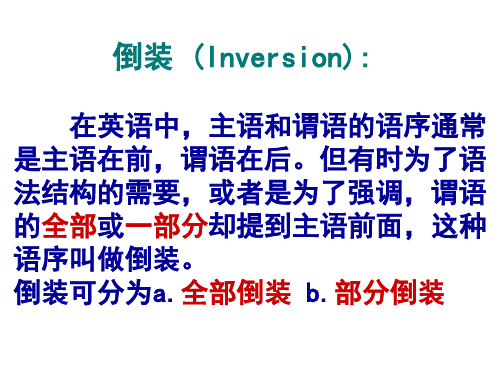
B 3. (2005江苏) ________ about wild plants that they decided to
make a trip to Madagascar for further research.
A. So curions the couple was B. So curious were the couple
open.
A. Try as she might
B. As she might try
C. She might as try
D. Might she as try
33. __D____, the boy knows a lot about computer.
A. Though is he young B. As is he young
3) 介词短语+be+主语 Among the goods are Christmas trees, flowers and toys.
6. 为了保持句子平衡或为了强调表语或状语,为 了使上下文紧密衔接。
a. inside the pyramids are the burial rooms for the s and queens.
如果后一个句子只是单纯的重复前面句子的意 思,则不倒装。
“It is hot today.” “So it is.”
“He finished it on time.” “So he did.”
当前面的句子中主语、谓语或肯否定形式不同时, 则用so it is with….,或it is the same with …句型来表 示。
A are hanging B hanged C hang D hangs
高中英语2025届高考语法复习倒装句知识讲解

高考英语语法复习倒装句知识讲解定义:谓语或谓语的一部分放在主语之前。
分类:完全倒装和部分倒装两大类。
完全倒装指整个谓语放在主语之前部分倒装指助动词、情态动词或be动词等放在主语之前一、完全倒装1.there be 句型there 也可以接appear, seem, stand, exist, lie, remain, live 等词There stands a tree in front of our class.There lies a river in front of my house.2.表示方位或时间的副词或介词短语如:now, then, here, there , then, up, down, in, away, out, in the room 等置于句首,且主语是名词时Now comes your turn.In front of my house lies a river.There goes the bell.Out rushed the students.注意: 如果主语是人称代词不倒装Here we are.Out they rushed.二、部分倒装1.否定意义的副词或连词放句首时如:no, not, never, seldom, little, hardly, nowhere, at no time, in no case, by no means, on no condition, in no way, under/in no circumstances等Never have I seen such a moving film.By no means will you find the key to the question on the Internet.2.only修饰副词、介词短语或从句作状语放在句首时Only in this way can we learn English well.Only then did she realize the importance of learning English.Only when he is ill, does he know how important health is.注意:only 修饰主语时, 句子不倒装Only can he tell the truth.(x)Only he can tell the truth.(√)3.Not until “直到”放句首时Not until he took off his sunglasses did I recognize him.Not until I began to work, did I realize how much time I had wasted.4.not only…but also “不仅…而且”放句首时Not only does he work hard but also he is willing to help others.Not only is he my English teacher, but also he is my friend.5.neither..., nor...“…不…, …也不…”Neither do I know it, nor do I care about it.6.no sooner...than, hardly/scarcely...when “一...就”Hardly had he arrived when the train left.No sooner had she gone than the traffic accident happened.7.“so+adj./adv.+ that...和“such+(a/an+) adj.+n.+ that...句型中, “so或such”放句首时So excited was he that he could not say a word.Such a good job has he done that we all admire him.8.“so + be 动词/ 助动词/ 情态动词 + 主语”用于对前面所说的肯定内容也适用于后者,表示“也”He is kind and helpful, so is she.I like English, so does he.They can speak English well, so can she.区分:He is kind and helpful, so he is.(不倒装表示“确实”)I like English, so I do.They can speak English well, so they can.9."neither/nor + be 动词/ 助动词/ 情态动词 + 主语”用于对前面所说的否定内容也适用于后者,表示“也不”He isn’t kind and helpful, neither/nor is she.I don’t like English, neither/nor does he.I can’t speak English well, neither/nor can she.注意:如果前面所说的内容既有肯定又有否定,或前后的谓语动词形式不一致时,则用结构“It is the same with +主语”或“So it is with +主语”I worked hard, but didn't pass the exam.So it was with my friend Lucy.10.as/though引导的让步状语从句结构 n./ adj./ v./ adv.+ as / though + 主语 + 谓语Child as he is, he knows a lot.(child 前不加冠词)Young as he is, he knows a lot.Try as he might, he failed.Much as I like Beijing, I can’t live there.11.频率的副词(often, many a time 等)放句首时Many a time has he made the same mistake.Often does he make the same mistake.12.虚拟语气if 引导的条件状语从句Were I you, I would work harder.Had you followed my advice, you would have passed the exam.Should it rain tomorrow, I would stay at home.13.某些表示祝愿的句子May you be happy!May your future become prosperous.。
高中英语知识点归纳倒装句的结构和应用

高中英语知识点归纳倒装句的结构和应用高中英语知识点归纳:倒装句的结构和应用倒装句是英语语法中一个常见而重要的句式。
它的结构和应用在高中英语学习中扮演着重要的角色。
本文将从基本结构入手,通过归纳总结,讨论倒装句的不同类型、用法以及注意事项。
一、基本结构倒装句是将助动词、情态动词或者谓语动词的部分提到主语之前的一种特殊的句子结构。
主要包括完全倒装和部分倒装两种形式。
1. 完全倒装完全倒装指的是将整个谓语放在主语之前,形式上改变了正常语序,常见的结构有:a) 在一般现在时和一般过去时中的助动词倒装:Never have I seen such a beautiful sunset.(我从未看过如此美丽的日落。
)Not until yesterday did he realize his mistake.(直到昨天他才意识到自己的错误。
)b) 在情态动词后的倒装:Can you swim?(你会游泳吗?)Should you need any further assistance, please do not hesitate to contact us.(如果您需要进一步的帮助,请随时联系我们。
)2. 部分倒装部分倒装是将谓语的助动词、情态动词或者be动词及其主语中的一部分提到句首,形成倒装句。
这种结构较为灵活,可以用于各种句子类型中。
a) 含有否定意义的副词或词组引导的倒装:Never have I been so embarrassed.(我从未感到如此尴尬。
)Under no circumstances should you reveal your password.(在任何情况下你都不应该透露密码。
)b) 含有“only”引导的倒装:Only in this way can we solve the problem effectively.(只有这样我们才能有效地解决问题。
)Only when he left did she realize how much she loved him.(只有在他离开之后她才意识到自己有多爱他。
高中英语知识点归纳倒装句的用法总结

高中英语知识点归纳倒装句的用法总结高中英语知识点归纳:倒装句的用法总结倒装句是英语语法中的一种特殊语法结构,常见于各种语言形式中。
倒装句通常在句子中,把谓语动词放在主语之前,从而改变了正常语序。
在英语学习中,倒装句是一个重要的知识点,掌握了它的基本用法,可以使我们的表达更加地准确、得体。
本文将对高中英语学习中与倒装句有关的知识进行归纳和总结,以便同学们更好地掌握和运用。
一、完全倒装句完全倒装句是指把整个谓语动词放在主语之前,常用于以下几种情况:1.以副词或介词词组开头的句子:- Never have I seen such a beautiful sunset. 我从未见过如此美丽的日落。
- In front of us stood a tall building. 在我们面前矗立着一座高楼。
2.以表示否定意义的副词开头的句子:- Not only did she forget my birthday, but she also didn't apologize. 她不仅忘记了我的生日,而且也没有道歉。
3.以表示“只有、仅仅、唯一”等意义的副词或词组开头的句子:- Only by working hard can you achieve your goals. 只有通过努力工作,你才能实现自己的目标。
4.以表地点的副词或介词短语放在句首,句子的主语为there时:- There is a cat under the table. 桌子下有一只猫。
- Here comes the train. 火车来了。
二、部分倒装句部分倒装句是指把助动词放在主语之前,常用于以下几种情况:1.以表示否定的词或短语开头的句子,包括never、not、seldom、hardly等:- Never have I seen such a talented musician. 我从未见过如此有天赋的音乐家。
2.以表示“只有、仅仅、唯一”等意义的副词或词组开头的句子,包括only、hardly等:- Only when the sun sets can we see the stars in the sky. 只有太阳下山后,我们才能看到天空中的星星。
高中英语语法倒装句讲解

高中英语语法倒装句讲解倒装句倒装句是英语中常见的一种句式,它的特点是把谓语动词放在主语之前,以达到强调的效果。
在倒装句中,常用的有全部倒装和部分倒装两种形式。
一、全部倒装全部倒装即把整个谓语部分放在主语之前。
当副词here。
there。
in。
out。
up。
down。
away。
back。
then。
ahead,off。
over等位于句首、谓语动词常为be。
come。
go。
follow。
run。
rush。
fly。
fall等不及物动词,而且主语又是名词时,用完全倒装。
注意:此类倒装只限于一般现在时和一般过去式,不用进行时态并且若主语是代词时,不用倒装。
同学们可借助下面的图形速记用于完全倒装的词。
1.介词短语(地点状语)+不及物动词+主语A beautiful girl sits under the tree。
= Under the tree sits a beautiful girl。
树下坐着一位漂亮的女孩。
A big ___ of the lake。
= South of the ___的南边是一个大超市。
A modern swimming pool is located 20 miles east of our school。
= 20 miles east of our school ___。
我们学校向东20英里有一个现代化的游泳池。
Piles of old books。
magazines and newspapers are on the floor。
= On the floor were piles of old books。
magazines and newspapers。
地板上是一堆堆旧的书报杂志。
2.表方向、地点的副词(here。
there。
up。
down。
away)+不及物动词+主语,构成的全部倒装句___ ___ barking fiercely。
away fled the ___。
听到狗的狂叫声,小偷逃掉了。
高中英语倒装句(完整版详细讲义+随堂练习)

Grammar of the Inversion (Module 5 Unit 4)倒装句英语最基本的语序是主语在前, 谓语动词在后。
但有时由于句子结构的需要或表示强调, 就要采用倒装形式。
倒装分两种情况: 1)将谓语动词完全移到主语之前称为完全倒装, 2)只将助动词或情态动词放到主语之前称为部分倒装。
并且强调性倒装和以so, neither, nor开头的句子是高考例题的热点。
一、倒装句的意义1.用倒装构成疑问句,适应一定的语法结构的需要。
.in?Was the People's Liberation Army founded in 1927?2.为了强调某一部分, 而把这部分放到句首, 构成倒装。
t.fo.schoo.thi.term.So early did he come to school that no other students came.二、倒装的用法完全倒装1.在“ther.be”结构里, there是引导词, 主语在be后。
在“there + be”结构中的谓语动词有时不用be , 而用表示类似“存在”观念的其他不及物动词。
如: live, stand, come, lie, flow, enter, rise 和appear等。
e.g.Ther.i..bo.o.th.table.There came shouts for help from the river.There lies a large wheat field in front of the house.Many years ago there lived an old man in the wooden house.2.为了表达生动, 有时把表地点、方位的副词, 如here, there, now , then,, thus ,up, down, out, off, over, away, in等放在句首, 同时把谓语动词放在主语之前, 在here, there等副词开头的某些句子里(要用一般现在时态)。
高中英语知识点归纳倒装句的用法

高中英语知识点归纳倒装句的用法倒装句是英语中的一种常见语法现象,它与一般的语序有所不同。
在倒装句中,谓语动词不再位于句子的中间,而是移到主语之前或状语之前,这种语法结构的运用可以使句子显得更加生动有趣。
下面将对高中英语中常见的倒装句进行归纳总结。
一、完全倒装句完全倒装句是指将助动词、情态动词或系动词放在主语之前,句子的谓语动词则位于主语之后。
完全倒装句的结构为:助动词/情态动词/系动词+主语+谓语动词+其他。
1.助动词完全倒装句助动词包括be动词、have动词和do动词。
当句子以副词here、there或表示方向的副词(如up、down、in、out等)开头时,为了突出地点或方向,可以采用助动词完全倒装的形式。
例如:Here comes the bus.There is a cat under the table.Down came the rain.2.情态动词完全倒装句情态动词包括can、could、may、might、must、shall、should、will、would等。
在表示祝愿、建议、命令等意义时,可以采用完全倒装的形式。
例如:May you have a happy birthday!Should you need any help, feel free to ask.Will you please close the door?3.系动词完全倒装句系动词包括be动词、seem、appear、look、sound等。
在表示位置、方式、状态、主语特征等方面时,可以采用系动词完全倒装的形式。
例如:On the table lies a book.How beautiful the flowers are!Tired as he was, he kept working.二、部分倒装句部分倒装句是指将谓语动词的一部分(通常是助动词或情态动词)与主语之间的位置对调,这种语法结构常见于否定句、选择疑问句和以感叹词开头的句子。
高中英语知识点归纳倒装句的分类与使用技巧

高中英语知识点归纳倒装句的分类与使用技巧高中英语知识点归纳:倒装句的分类与使用技巧倒装句是英语语法中的一种特殊结构,通常将助动词、情态动词或be动词置于句首,而将主语放在谓语动词之后。
本文将对高中英语中的倒装句进行分类并介绍其使用技巧。
一、完全倒装句完全倒装句是指将句子的全部谓语动词置于主语之前,通常用于以下三种情况:1. 当以表示地点的副词或介词短语开头时,如:Here comes the bus.(汽车来了。
)2. 当以表示方向的副词或介词短语开头时,如:Out rushed the children.(孩子们冲了出去。
)3. 当以表示否定意义的副词或介词短语开头时,如:Never have I seen such a beautiful sunset.(我从未见过如此美丽的日落。
)二、部分倒装句部分倒装句是指将助动词、情态动词或be动词置于句首,而将主语和谓语动词继续保持原来的位置。
部分倒装句常见于以下几种情况:1. 某些表示习惯、偏好、意愿、建议的动词后,如:I would rather you came early.(我宁愿你早点来。
)2. 在表语从句中,如:What she needs is not money, but love.(她需要的不是金钱,而是爱。
)3. 在条件状语从句或时间状语从句中,如:Should you have any questions, feel free to ask.(如果你有任何问题,请随时提问。
)4. 在虚拟条件句中,如:Had I known earlier, I would have helped.(要是我早知道,我会帮忙的。
)三、倒装句的使用技巧1. 在虚拟语气中,常用部分倒装句来表达与事实相反的假设,如:Were it not for your help, I would have failed.(要不是你的帮助,我就会失败。
)2. 当表示时间或地点的副词放于句首时,采用完全倒装句,如:In front of me stood a majestic mountain.(在我面前矗立着一座雄伟的山峰。
高中英语倒装句专题讲解(共37张)
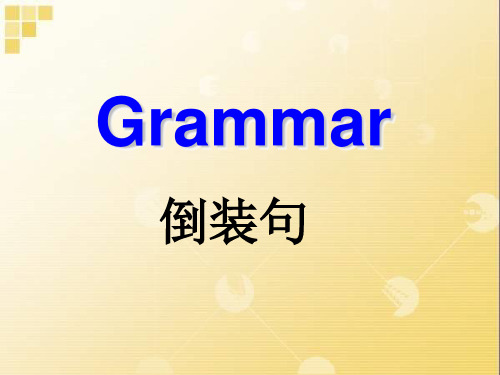
Not until his mother came back did he finish his homework.
c.“一…就…”句型的运用
Hardly/Scarcely …when … No sooner …than …
主句使用部分倒装, 且用过去完成时, 从 句用一般过去时。
1.I had no sooner set off than it began to rain. No sooner _h_a_d__I_s_e_t_o_f_f than it began to rain.
某人确实如此
e.g. Betty is a nice girl. So she is .
5. So/Such …that…引导状语从句, 当so、 such置于句首, 主句要部分倒装。
He spoke so loudly that even people in the next room could hear him.
Never will I forget the day when I joined the Youth League.
2). 在含有no的介词短语词组出现在句首时, 如 in no way, in no case, by no means, at no time, under no circumstances, under no condition, on no account 等表示‘决不’的词组。
通常是主语在前, 谓语在后。
Now come但th有e m时e谓n’语s 1的10全hu部rd或le者s. 一部 Out rush t分he(at通hl常ete是s.助动词或情态动 Up they ju词m)p.却提到主语的前面, 这种 So fast does Jo语h序n r叫un做th“a倒t h装e b”re。aks the school record.
高中英语倒装句讲解

高中英语倒装句讲解高中英语倒装句讲解一、什么是倒装句倒装句是英语中常用的一种语法结构,它通过改变句子中词语的正常顺序,使句子更加生动、形象。
在倒装句中,主语和宾语的位置常常颠倒,同时句子结尾的语态也不同于正常语序。
二、倒装句的种类1、完全倒装句:这种类型的倒装句把主语和宾语完全颠倒,让宾语出现在主语之前。
例如:“Here comes the bus”(公交车来了)。
2、部分倒装句:这种倒装句只把助动词、系动词或情态动词放在主语前面,其余部分仍保持正常语序。
例如:“Are you ready to leave?”(你准备好离开了吗?)三、如何使用倒装句1、为了让句子更加生动,可以使用倒装句。
例如,比起常规语序的“The book is on the table”,使用倒装句“On the table is the book”更能突出物体的位置。
2、在一些情况下,使用倒装句可以更好地表达对比、惊讶等感情色彩。
例如,“Out rushed the dog”比“The dog rushed out”更能表达出狗冲出来的急迫感。
3、在一些疑问句中,为了更好地表达疑问点,需要使用倒装句。
例如,“Did he go to school yesterday?”比“Did he go to school?”更加具体。
四、注意事项1、在使用倒装句时,要注意句子的逻辑性和连贯性,避免出现歧义或误解。
2、在写作中,要根据文章的整体风格和语境来选择使用倒装句,不要过度使用,以免影响阅读体验。
3、在学习倒装句时,要掌握不同类型的倒装句的语法规则,并通过大量的阅读和写作实践来提高自己的语感和应用能力。
总之,掌握英语倒装句对于提高英语表达能力和写作水平都非常重要。
通过深入理解倒装句的语法规则,正确运用倒装句,可以让我们的英语表达更加生动、丰富,更具有表现力和感染力。
高中英语倒装句讲解

高中英语倒装句讲解 Final approval draft on November 22, 2020倒装句讲解英语句子通常有两种语序:一种是陈述语序,一种是倒装语序。
将谓语的一部分或全部置于主语之前的语序叫做倒装语序。
倒装可分为二种:将整个谓语提到主语之前的叫完全倒装(full inversion);而只将be 、情态动词或者助动词放在主语之前的叫做部分倒装(partialinversion)。
形式倒装:只把强调的内容提至句首,主谓并不倒装形式倒装有四类:(1)感叹句:What + a/an + adj +n.+(主语+谓语)!How + adj /adv.+(主语+谓语)!(2)The+比较级+正常语序句子,The+比较级+正常语序句子。
“越……,越…….。
”(3)Whatever+n.+主语+谓语,主句。
However+ adj/adv+主语+谓语,主句。
(4)As/Although引导让步状语从句时,可以对表语、谓语、状语进行强调。
(注意:若对表语进行强调时,表语为单数可数名词,形容词最高级时,要省掉冠词)一、完全倒装1. There be结构。
另外,在此结构中可以用来代替be动词的动词有:exist, seem, happen, appear, live, rise, stand等。
如:There stood a dog before him.There exist different opinions on this question.巩固练习:1) ________ a beautiful palace ________ the foot of the hill.A. There stand; atB. There stands; underC. Stands there; underD. There stands; at2 (1).在以here、there、now、then等副词开头的句子里。
高中英语知识点归纳倒装句的用法及常见情况

高中英语知识点归纳倒装句的用法及常见情况倒装句是英语语法中一个重要的句法结构,它在句子中有特殊的应用。
本文将归纳总结高中英语中关于倒装句的用法及常见情况,以帮助大家更好地理解和运用倒装句。
一、倒装句的基本用法倒装句是指把原本主语和谓语的次序颠倒,使谓语动词或助动词出现在主语之前的一种句法结构。
在英语中,倒装句主要有三种基本形式:全部倒装、部分倒装和助动词倒装。
1. 全部倒装全部倒装是指将整个谓语部分完全颠倒,即将谓语动词或助动词放在主语之前。
常见情况有:在以否定词开头的句子中,当否定副词not,never,hardly,scarcely,little等放在句首时;以及在表示地点、时间或方式的状语从句中。
例1:Not only does he speak English fluently, but he also speaks French.例2:Hardly had I arrived home when it started to rain.例3:In the garden were some beautiful flowers.2. 部分倒装部分倒装是指将助动词,或情态动词,或谓语动词的某些形式移到主语之前。
常见情况包括:带有否定意义的词或短语出现在句首时;含有表示条件的副词或介词短语的句子;以及为了强调某一部分内容。
例4:Never have I seen such a beautiful sunset.例5:Had I known the truth, I would not have told her.例6:Only in this way can we achieve success in our study.3. 助动词倒装助动词倒装是指将助动词提到主语之前,用于疑问句或以so/neither/nor开头的句子,其目的是避免重复。
例7:Do you know him? —— No, I don't.例8:She is reading a book, and so am I.例9:He doesn't like ice cream, and neither do I.二、倒装句的常见情况除了基本的倒装句形式外,倒装句还有一些常见的情况和特殊用法需要掌握。
高中英语倒装句语法知识点
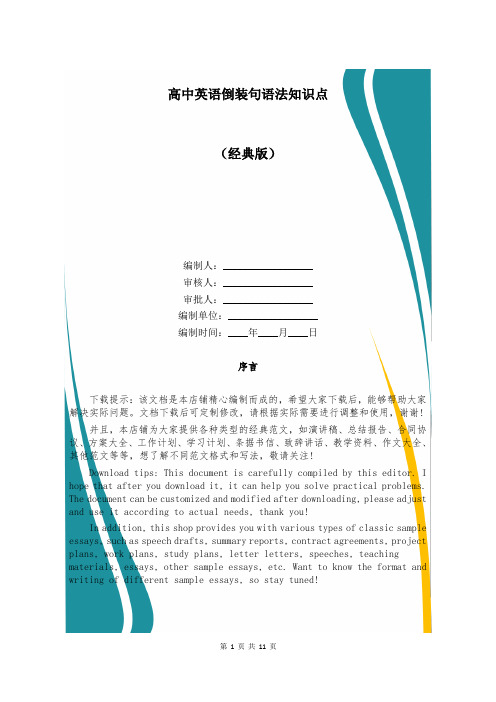
高中英语倒装句语法知识点(经典版)编制人:__________________审核人:__________________审批人:__________________编制单位:__________________编制时间:____年____月____日序言下载提示:该文档是本店铺精心编制而成的,希望大家下载后,能够帮助大家解决实际问题。
文档下载后可定制修改,请根据实际需要进行调整和使用,谢谢!并且,本店铺为大家提供各种类型的经典范文,如演讲稿、总结报告、合同协议、方案大全、工作计划、学习计划、条据书信、致辞讲话、教学资料、作文大全、其他范文等等,想了解不同范文格式和写法,敬请关注!Download tips: This document is carefully compiled by this editor. I hope that after you download it, it can help you solve practical problems. The document can be customized and modified after downloading, please adjust and use it according to actual needs, thank you!In addition, this shop provides you with various types of classic sample essays, such as speech drafts, summary reports, contract agreements, project plans, work plans, study plans, letter letters, speeches, teaching materials, essays, other sample essays, etc. Want to know the format and writing of different sample essays, so stay tuned!高中英语倒装句语法知识点英语最基本的词序是主语在谓语动词的前面。
高中英语语法倒装句
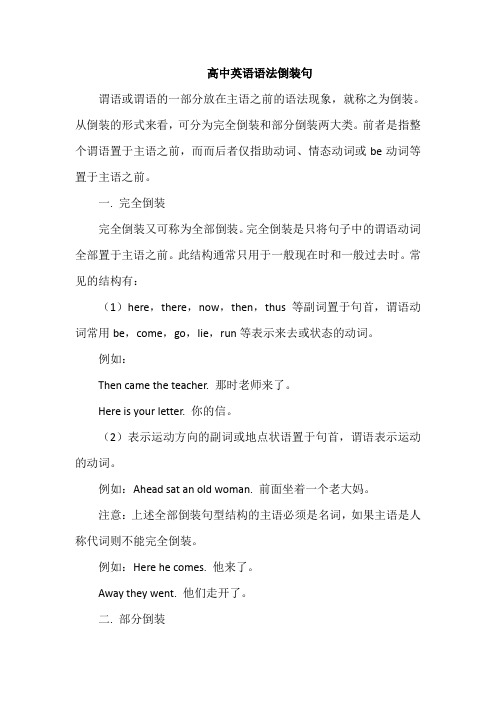
高中英语语法倒装句谓语或谓语的一部分放在主语之前的语法现象,就称之为倒装。
从倒装的形式来看,可分为完全倒装和部分倒装两大类。
前者是指整个谓语置于主语之前,而而后者仅指助动词、情态动词或be动词等置于主语之前。
一. 完全倒装完全倒装又可称为全部倒装。
完全倒装是只将句子中的谓语动词全部置于主语之前。
此结构通常只用于一般现在时和一般过去时。
常见的结构有:(1)here,there,now,then,thus等副词置于句首,谓语动词常用be,come,go,lie,run等表示来去或状态的动词。
例如:Then came the teacher. 那时老师来了。
Here is your letter. 你的信。
(2)表示运动方向的副词或地点状语置于句首,谓语表示运动的动词。
例如:Ahead sat an old woman. 前面坐着一个老大妈。
注意:上述全部倒装句型结构的主语必须是名词,如果主语是人称代词则不能完全倒装。
例如:Here he comes. 他来了。
Away they went. 他们走开了。
二. 部分倒装部分倒装是指将谓语的一部分如助动词或情态倒装放到主语之前。
如果句子的谓语没有助动词或情态动词,则需添加助动词do,does 或did,并将其置于主语之前。
(1)句首为否定或半否定的词语,如no, not, never, seldom, little, hardly, at no time, in no way, not until…等。
例如:Never have I seen such a performance.从未见过如此糟糕的表演。
Nowhere will you find the answer to this question.无论如何你不会找到这个问题的答案的。
Not until the child fell asleep did the mother leave the room.母亲一直到孩子入睡后才离开房间。
高中英语知识点归纳倒装句

高中英语知识点归纳倒装句倒装句是英语语法中的一个重要概念,常常用于强调句子的某个部分或为了实现语法需求。
在高中英语学习过程中,倒装句是必须掌握的一种语法结构。
本文将对倒装句的知识点进行归纳总结,包括倒装语序的基本形式、用途以及一些常见的倒装句类型。
1. 完全倒装在完全倒装中,整个谓语动词位于主语之前,用以强调句子中其他成分。
a. 当句子以副词或短语开头时,通常会使用完全倒装。
例如:- Never have I seen such a beautiful sunset.- In no way could he understand the meaning of the poem.b. 当表示地点或时间的介词短语放在句首时,常常使用完全倒装。
例如:- On the top of the mountain stood a small cottage.- At the end of the corridor hangs a famous painting.c. 当表示“here”、“there”或“out”放在句首时,也会使用完全倒装。
例如:- Here comes the bus!- There goes the bell!2. 部分倒装部分倒装是指将助动词或情态动词与主语之间调换位置,或者将系动词与主语之间调换位置。
它通常用于祈使句、虚拟条件句、以"neither/nor"或"either/or"引导的倒装句等。
a. 在以“May/Can/Will/Should等情态动词”引导的祈使句中,部分倒装会出现。
例如:- May you have a wonderful journey!- Can you please pass me the salt?b. 在虚拟条件句中,当条件句以"had"或"should"开头时,常常使用部分倒装。
高三英语倒装句知识点
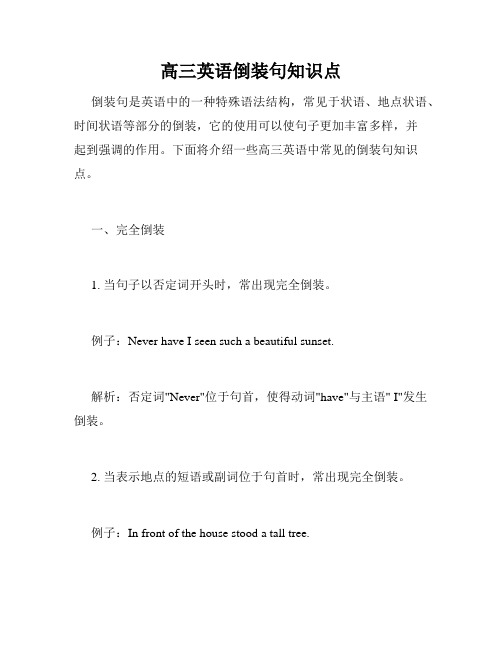
高三英语倒装句知识点倒装句是英语中的一种特殊语法结构,常见于状语、地点状语、时间状语等部分的倒装,它的使用可以使句子更加丰富多样,并起到强调的作用。
下面将介绍一些高三英语中常见的倒装句知识点。
一、完全倒装1. 当句子以否定词开头时,常出现完全倒装。
例子:Never have I seen such a beautiful sunset.解析:否定词"Never"位于句首,使得动词"have"与主语" I"发生倒装。
2. 当表示地点的短语或副词位于句首时,常出现完全倒装。
例子:In front of the house stood a tall tree.解析:地点短语"In front of the house"位于句首,使得动词"stood"与主语" a tall tree"发生倒装。
3. 当表示方向的副词放在句首时,常使用完全倒装。
例子:Down the street ran the little boy.解析:副词"Down"置于句首,使得动词"ran"与主语" the little boy"发生倒装。
二、部分倒装1. 当句子以表示否定的副词或短语开头时,常出现部分倒装。
例子:Not only did she pass the exam, but she also got the highest score.解析:否定副词"Not only"位于句首,使得助动词"did"与主语"she"发生倒装。
2. 当使用含有比较级的状语从句时,常出现部分倒装。
例子:The harder you work, the more progress you will make.解析:状语从句"the harder you work"中的主谓发生倒装。
- 1、下载文档前请自行甄别文档内容的完整性,平台不提供额外的编辑、内容补充、找答案等附加服务。
- 2、"仅部分预览"的文档,不可在线预览部分如存在完整性等问题,可反馈申请退款(可完整预览的文档不适用该条件!)。
- 3、如文档侵犯您的权益,请联系客服反馈,我们会尽快为您处理(人工客服工作时间:9:00-18:30)。
Module 3 LiteraturePeriod3 Grammar1 (3.26 2课时)一.学习内容1.学习倒装句,并能熟练运用。
二.学习方法提前预习课本,预习新语法点知识点。
语法:倒装句一、简介1.定义:英语句子的自然语序是主语在前,谓语动词在后。
有时为了语法结构的需要或是为了强调,若把谓语动词放在主语之前,主谓倒装,则构成倒装句。
2、分类:①完全倒装:如果全部谓语放在主语之前,叫完全倒装。
Eg.There is a book on the table.②部分倒装:如果只把助动词,情态动词或系动词放在主语之前就叫部分倒装。
eg. Only in this way can we learn English well.二、讲解1.完全倒装通常只用于一般现在时和一般过去时,且主语是名词①There be 句型:There be 句型中(be 还可以换成live,stand, lie, exist等表示状态的动词)要用完全倒装。
eg. There stands a tall tree on the top of the hill.②以here, there开头的句子里,谓语是come,go等不及物动词的单个形式时。
eg. There goes the bell.Here are the books.等方向性副词开头的句子,需完全倒装。
③副词out, in, up, down, off, away, below, back以及now, then,thus开头的句子里,谓语动词是come, go, be, run等不及物动词的单个形式时。
eg. Away hurried the boy.Now comes your turn.Up it flew.The door opened and in came our headmaster.④表地点的介词短语位于句首(如:in the room, on the wall等),谓语是be, stand, sit, lie等单个动词时,需完全倒装eg. In a lecture hall of a university in England sits a professor.Around the lake are some tall tree.At the end of the valley lies a small lake.Under the table sleeps a brown cat.⑤形容词、过去分词或介词短语作表语置于句首时,表语+系动词+主语(如:such),需完全倒装。
eg. Such was Albert Einstein, a simple man and the 20th century's greatest scientist.Gone are the days when we enjoyed the happy time in the wood.Seated on the ground are a group of young people.注意:在表语置于句首的倒装结构中,要注意其中的谓语应与其后的主语保持一致,而不是与位于句首的表语保持一致。
2.部分倒装①so 用于肯定句,通常指前面所说的肯定情况也适合于其他人(或物)。
其结构为:So + be ( do, have等其他助动词或情态动词) + 主语。
译成汉语表示“也一样”,需倒装。
eg. Tom will go there next summer, and so will I.He can speak French. So can I.②nor, neither 用于否定句,通常指前面所说的否定情况也适合于其他人(或物)。
其结构为:Nor / Neither + be ( do, have 等其他助动词或情态动词) + 主语。
译成汉语表示“也不…”,需倒装。
eg. He didn’t see the film, neither did she.I d on’t enjoy singing, nor did I like computer games.She is not into music, nor am I.③Only修饰状语(副词、介词短语)或状语从句,且放在句首时eg. Only in this way can we learn English well.Only when I got there did I know the truth.Only in the morning can you meet him.Only him did I see yesterday.注意1.在部分倒装句中,如果谓语部分无情态动词,则须找助动词。
eg. Only after the war did he learn the sad news.2. “only +状语从句”位于句首时,主句倒装,从句不倒装。
eg.Only when he returned did we find out the truth.3. only 修饰主语时,句子不可倒装eg. Only he can answer the question.③否定意义的词或短语,位于句首,需部分倒装。
如否定词no, not, never, nor;半否定词hardly, seldom, scarcely, barely, rarely, little, few;合成的代词或副词nobody, nothing, nowhere;否定的短语at no time, (决不,任何时候都不) not until, by no means(决不),in no way(决不),in no time(立刻,马上),under/in no circumstances(在任何情况下都不)。
eg. No word did he say before he left.Nowhere will you find better roses than theses.Not until he went abroad did he know the truth.By no means shall we give up.Little did I know about it.④在含有were, had, should的if虚拟条件句中,省略if,将were, had, should 移到句首,需部分倒装。
eg. Had I had any money with me ,I could have lent you some .---- If I had any money with me ,I could lend you some .Were Jack here, they would be able to solve the problem.----If Jack were here, they would be able to solve the problem.Should he fail in the experiment this time, he would try again.---- If he should fail in the experiment this time, he would try again.⑤not only (merely, alone, simply)…(but) also 连接两个并列分句,前一分句需倒装。
译为:“不仅……而且……”Not only did we lose our money, but we also came close to losing our lives.Not simply is this book interesting but also instructive.注意:Not only you but also I(连接并列主语不倒装)will attend the meeting.⑥neither…nor连接两个并列分句,前后两个分句都倒装。
译为:“……不……,……也不……”eg. Neither did they write nor did they telephone.Neither is he wrong nor are you.Neither could I help you, nor could he.注意:Neither you nor I(连接并列主语不倒装)like this book. ⑦so…that…和such…that…引导状语从句,当so或such提到句首时,主句需用倒装语序。
译为:“如此……以至于……”so后面句子要倒装,that后面句子不倒装eg. So interesting is that story that everyone wants to read it..So good a girl is she that we all like her.Such a good girl is she that we all like her⑧Not until...“直到……才……”位于句首,也可写成not...until...,如果为此句型,until后面的从句不可倒装eg. Not until he returned did we have supper.⑨as / though 当“虽然,即使”讲,引导让步状语从句时,从句要用倒装语序。
其结构为:名词形容词+ as + 主语+ 动词(或情态动词)副词动词原形eg. Old as / though he is, he works like a young man.Much as I admire her, I can’t forgive her faults.Try again as / though he will, he can’t succeed.In the classroom as / though he st ays, he doesn’t read his texts.注意:Child as / though he is, he knows much about the society.(表语是单数可数名词,倒装时省略名词前的a/an)练习1. For a moment nothing happened. Then all shouting together.A. voices had comeB. came voicesC. voices would comeD. did voices come2. The computer was used in teaching. As a result, not only _________, but students became more interested in the lessons.A. saved was teachers’ energyB. was teachers’ energy savedC. teachers’ energy was savedD. was saved teachers’ energy3. So sudden ________that the enemy had no time to escape.A. did the attackB. the attack didC. was the attackD. the attack was4. Little____about her own safety, though she was in great danger herself.A. did Rose careB. Rose did careC. Rose does careD. does Rose careModule 3 Literature课后巩固练习(4.9 1课时)5. Not until I came home last night ________ to bed.A. Mum did goB. did Mum goC. went MumD. Mum went6. Unsatisfied _________with the payment, he took the job just to get some work experience.A. though was heB. though he wasC. he was thoughD. was he though7. It was announced that only when the fire was under control ________ to return to their homes.A. the residents would be permittedB. had the residents been permittedC. would the residents be permittedD. the residents had been permitted8. Only when I left my parents for Italy _______ how much I loved them.A.I realizedB.I had realizedC. had I realizedD. did I realize9. Bill wasn’t happy about the delay of the report by Jason,and ______.A. I was neitherB. neither was IC. I was eitherD. either was I10.— How was the televised debate last night?—Super! Rarely _________ so much media attention.A. a debate attractedB. did a debate attractC. a debate did attractD. attracted a debate11. Little _______ that we were watching his every move,so he seemed to be going his own way in this business.A. he realizedB. he didn’t realizeC. didn’t h e realizeD. did he realize12. —Father,you promised!—Well, _______ .But it was you who didn’t keep your word first.A. so was IB. so did IC. so I wasD. so I did13. Never in my wildest dreams ________ these people are living in such poor conditions.A.I could imagineB. could I imagineC. I couldn’t imagineD. couldn’t I imagine14. At the foot of the mountain __________.A. a village lieB. lies a villageC. does a village lieD. lying a village15. Only then _________ how much damage had been caused.A. she realizedB. she had realizedC. had she realizedD. did she realize16. __________ about wild plants that they decided to make a trip to Madagascar for further research.A. So curious the couple wasB. So curious were the coupleC. How curious the couple wereD. The couple was such curious17. Never before _________in greater need of modern public transport than it is today.A. has this city beenB. this city has beenC. was this cityD. this city was18. They have a good knowledge of English but little __________ they know about German.A. haveB. didC. hadD. do19. —Did Linda see the traffic accident?—No,no sooner _________ than it happened.A. had she goneB. she had goneC. has she goneD. she has gone20. ___________homework did we have to do that we had no time to take a rest.A. So muchB. Too muchC. Too littleD. So little21. —It’s burning hot today,isn’t it?— Yes. ________ yesterday.A. So was itB. So it wasC. So it isD. So is it22. Under no circumstances, I was warned, _________ to give the password to someone else.A. could IB. I couldC. I wasD. was I23. Woman ___ Hillary Clinton is, she was bold enough to participate in the presidential campaign, 2008.A. whoB. asC. thatD. like24. The old couple have been married for 50 years and never once _______with each other.A. they have quarreledB. they quarreledC. have they quarreledD. had they quarreled25. — Is everyone here?—Not yet. Look, there_______ the rest of our guests!A. comeB. comesC. is comingD. are coming35. John opened the door. There _____ he had never seen before.A. a girl did standB. a girl stoodC. did a girl standD. stood a girl36. At the meeting place of the Yangtze River and Jialing River , one of the largest cities in China.A. lies ChongqingB. Chongqing liesC. does lie ChongqingD. does Chongqing lie37. Distinguished guests and friends, welcome to our school. the ceremony of the 50th Anniversary this morning are our alumni(校友)from home and abroad.A. AttendB. To attendC. AttendingD. Having attended38. I travel to the Binhai New Area by light railway every day, do many businessmen who live in downtown Tianjin.A. asB. whichC. whenD. though39. Hearing the dog barking fiercely, away .A. fleeing the thiefB. was fleeing the thiefC. the thief was fleeingD. fled the thief40. Out , with a stick in his hand.A. did he rushB. rushed heC. he rushedD. he did rush41. the plane.A. Flew downB. Down flewC. Down was flyingD. Down fly42. I had time, I would have run around the lake again.A. IfB. UnlessC. HadD. When43. I ten years younger, I would be able to clime the too of the mountain.A. AmB. WasC. WereD. Be44. In front of the farmhouse .A. lay a peasant boyB. laid a peasant boyC. a peasant boy layD. did a peasant boy lie45. On the river bank where he once lived.A. stand a houseB. a house standsC. does a house standD. stands a house46. Such a noise that I couldn’t make myself heard.A. are thereB. there isC. was thereD. there are47. Out after the door was opened.A. did the dog runB. ran the dogC. the dog ranD. does the dog run 48. time, they would certainly come and help us.A. If had theyB. If they hadC. Had theyD. both B and C49. Look! .A. There does Jane comeB. There comes JaneC. There is Jane comingD. Jane is there coming50. hot is the sun that we cannot go out at present.A. VeryB.TooC. SoD. Such51. and caught the mouse.A. Up the cat jumpedB. The cat up jumpedC. Up jumped the catD. Jumped up the cat52. , I would have phoned you.A. If I knew itB. Had I known itC. If I know itD. Did I know it53. the rain stop, the crops would be saved.A. DidB. ShouldC. WouldD. Will1-5 BBCAB 6-10 BCCBA 11-15 BDDBD 16-20 ACBBD21-25 BADAA 26-30ADBDB 31-35CCDBD 36-40 ACADC41-45 BCCAD 46-50CBBBC 51-53CBB。
